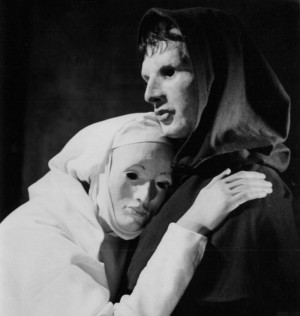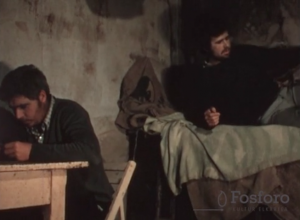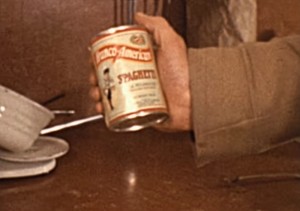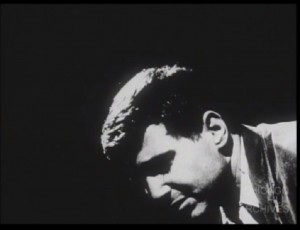
"Unedited assembly of takes (some with slates) from Fox's unfinished film, intended as a symbolic rendition of the story of Abelard (d. 1142) and Heloise (d. 1164). Uses masked actors, expressionistic lighting and movement, and visual metaphors suggestive of various emotions." (British Columbia Archives)
"This proved to be an unusual serio-comedy, telling of a restless young husband and how he was cured. It was very well acted by Alfred Fontana as the husband, Margaret Ervin as the vamp, Anne Howe, and Beatrice Traendly as the wife. The directon of Russell T. Ervin Jr. was remarkably good, revealing an unusual facility for telling a story concisely and quickly. Then too, he understood how to cover any histrionic imperfections of his cast. 'And How!' is a suprisingly neat amateur film" Photoplay, June. 1928, 66
"The Conscience is one of those psychological studies without being too psychological in its treatment and approach. A hit and run driver decides no one will know his crime, but he finds it hard to live with his conscience. Everywhere he looks he sees himself as judge and as prosecutor, finding himself guilty as he pleads for mercy. Photography is not the best, but the story is quite powerful" PSA Journal, Aug. 1967, 37.
"The combined efforts of Massimo Sani-photography and Ezio Pecora-directing. A slowly paced, sensitive portrayal of adolescent emotions. While in many amateur films the acting is such that we can never forget it is a movie and that the actors are aware of the camera, in "Encounter on the River", the acting is natural, making this tender, almost too subtle story most enjoyable. The best directed amateur film seen in years." PSA Journal, Dec. 1955, 36.

Un hombre vaga por las calles de un pueblo buscando tabaco en botes de basura o en el camino. Al entrar a un bar, un hombre nota que está buscando algo, por lo que lanza tabaco al suelo y cuando el primero se agacha a recogerlo, el otro lo tira al suelo mientras todos en el bar se ríen de él. Al regresar al cuarto en el que vive, otro hombre se encuentra ahí descansando. Los hombres tienen una breve conversación sobre cuándo se irá el otro, mientras que este da una excusa y le pide algo de tabaco al primer hombre. El primero se niega y le dice que el tabaco es muy difícil de conseguir, provocando la ira del segundo, quien decide asesinarlo apuñalándolo por la espalda. Después de enterrar su cuerpo, vuelve al cuarto donde se siente culpable y después de llorar por un rato, decide suicidarse.
A man wanders the streets of a town looking for tobacco in trash cans or the road, he enters a bar and a man notices that he is looking for something, he throws some tobacco on the floor and when the first man tries to reach it, he shoves him to the floor while the rest of the men in the bar laugh at him. When he goes back to the room he lives in, there is another man there resting. They have a small conversation about when the man lying down will leave, he gives an excuse and then asks the other for some tobacco. The first man refuses and tells him it is too hard to get, provoking the anger of the second one who then he chooses to kill him by stabbing him in the back. After burying his body he goes back and feels guilty, after crying for some time, he chooses to kill himself.

A man writes a note to inform his wife that he is leaving her. He then goes for a walk, seemingly with grave thoughts on his mind. He encounters sights which inspire him to return home, where he finds his wife in an alarming condition.

"Traces the romantic relationship between a young man and woman (played by Klugman and Judy Harris) who meet in a downtown coffee shop; their nonstop dialogue fluctuates between playful psycho-babble and sincere attempts to relay their innermost feelings." Chicago Film Archives.
"A film by CBC Montreal video technician Robert Lachapelle about a little boy who steals a classmate's pen, suffers pains of conscience and finally confesses to his teacher" The Ottawa Journal.
"Indecisive tells the story of a girl who is rather mixed up and can't decide if it is worth while to go on living. The treatment is unlike most amateur efforts and because of its novel approach the film maintains interest to the end" PSA Journal, Sept. 1965, 50.
"Bill Messner has turned to religion and nature for his soul-searching film. His leading man, Sam, has a fine home, family and job and is too busy for extra activities such as church assignments. His personal relations suffer from his self imposed confinement. Something persuades Sam to make a retreat to a religious camp. There are the usual at camp activities, plus the opportunity for devotion and contemplation; the relation of ones soul; the atmosphere to reflect purpose and accomplishment. Introspection is the keystone of the picture and well done it is" PSA Journal, Nov. 1958, 48.
Total Pages: 3